|
|
|
Sort Order |
|
|
|
Items / Page
|
|
|
|
|
|
|
| Srl | Item |
| 1 |
ID:
177499


|
|
|
|
|
| Summary/Abstract |
This study provides empirical evidence on the association between board attributes and corporate social responsibility (CSR) engagement—as well as between CSR engagement and corporate performance—in the global energy sector. The data for the period of 2011–2018 was obtained from Thomson Reuters. The results indicate that board diligence and CSR committees are robust drivers of CSR performance, as proxied by the composite environmental, social, and governance (ESG) score along with its three individual indicators. While board independence is more influential in boosting the aggregate ESG score and the governance indicator, the board's gender diversity is more influential in environmental and governance indicators. However, higher CSR performance does not guarantee higher financial performance—as proxied by both market and accounting performance. We provide theoretical and practical implications, to guide regulators and energy firms in ensuring the sustainable development of the sector.
|
|
|
|
|
|
|
|
|
|
|
|
|
|
|
|
| 2 |
ID:
086012


|
|
|
|
|
| Publication |
2009.
|
| Summary/Abstract |
The Product (RED) initiative was launched by Bono at Davos in 2006. Product RED is 'a brand created to raise awareness and money for the Global Fund to Fight AIDS, Tuberculosis and Malaria by teaming up with iconic brands to produce RED-branded products'. With the engagement of American Express, Apple, Converse, Gap, Emporio Armani, Hallmark and Motorola, consumers can help HIV/AIDS patients in Africa. They can do so simply by shopping, as a percentage of profits from Product (RED) lines goes to support the Global Fund. In this article we examine how the corporations that are part of this initiative use RED to build up their brand profiles, sell products and/or portray themselves as both 'caring' and 'cool'. We also show that, more than simply being another example of cause-related marketing (like the pink ribbon campaign or the ubiquitous plastic armbands), RED engages corporations in profitable 'helping' while simultaneously pushing the agenda of corporate social responsibility (CSR) towards solving the problems of 'distant others'
|
|
|
|
|
|
|
|
|
|
|
|
|
|
|
|
| 3 |
ID:
062048


|
|
|
|
|
| Publication |
May 2005.
|
| Summary/Abstract |
Contrasting perspectives of international companies and civil society groups have divided recent debates about corporate responsibility in developing countries. The Corporate Social Responsibility discourse has been promoted by business lobbies, emphasizing the role of international companies in voluntarily contributing towards the solution of pressing social and environmental problems through partnerships with other stakeholders. The notion of corporate accountability has become the rallying point for sustainable development, demanding stricter regulation of corporate behaviour by national governments and the enactment of an international corporate accountability convention. This article assesses the promises and pitfalls of these two competing approaches to industries in South Africa. The article argues that a multi-level approach is necessary to the impact of CSR and corporate accountability initiatives. It concludes that CSR may improve environmental management systems and reduce corporate pollution levels whereas corporate accountability approaches may provide important incentives for companies to improve their environmental performance, assist in the development of national environmental governance frameworks guiding company-community interaction, and facilitate the enforcement of national legislation pertaining to corporate responsibility. However, both approaches fail to address the underlying, globallevel structural causes of conflicts between companies and stakeholders affected by their operations. These conflicts can only be reversed by fundamental changes in the global economy.
|
|
|
|
|
|
|
|
|
|
|
|
|
|
|
|
| 4 |
ID:
062045
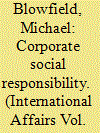

|
|
|
|
|
| Publication |
May 2005.
|
| Summary/Abstract |
Corporate Social Responsibility (CSR) has been adopted as an approach to international development. But who does it benefit and in what ways? Most importantly, does it allow certain interest groups to redefine the meaning of international development success?
This article examines the historical relationship between business and development and compares how expectations of business as exemplified through CSR practices differ from those in the past. It then looks at the role and expectations of business in developing countries and proposes two tests for assessing if CSR makes a positive contribution to development goals based on whether it redefines the meaning of good business practice in the interests of the poor and marginalized, and if it helps development practitioners to manage more effectively the possibility and consequences of global capitalism for poor countries.
The article argues that the interests of business are not adequately aligned with those of the poor, and explains why CSR does little to redress this. It argues that the business case in some instances overrides the developmental case for certain actions, and that business thinking is increasingly evident in the policies and practices of international development. Although CSR may have a positive contribution to make in some circumstances, its limitations need to be understood if development's case for involving business is not to be subsumed by business reasons for engaging with (and by-passing) developing countries.
|
|
|
|
|
|
|
|
|
|
|
|
|
|
|
|
| 5 |
ID:
098940
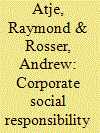

|
|
|
| 6 |
ID:
095056
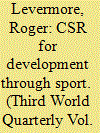

|
|
|
|
|
| Publication |
2010.
|
| Summary/Abstract |
Recent publications have highlighted the growth of sport as a vehicle in deploying corporate social responsibility (CSR) programmes or for disseminating international development initiatives. However, very little has been written on the considerable increase of the use of sport with corporate social responsibility to further social and economic development. This will expand as a range of CSR for development initiatives are being launched to coincide with mega-sports events in the coming years, starting with the 2010 football World Cup. This article addresses this gap by charting the ways in which sport is being used by businesses (ranging from multinational corporations to sports federations) as part of discrete development initiatives. It highlights the opportunities (notably developing partnerships and reaching those alienated from traditional development) and limitations associated with this. Limitations form around Stefano Ponte et al's typology of CSR initiatives, which is used to highlight the fact that many projects are poorly linked to core business objectives and are therefore less likely to be taken seriously and succeed. A lack of evaluation and the tarnished reputation of sport are other problems associated with CSR for development through sport.
|
|
|
|
|
|
|
|
|
|
|
|
|
|
|
|
| 7 |
ID:
104437
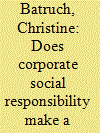

|
|
|
| 8 |
ID:
173818
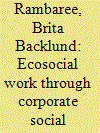

|
|
|
|
|
| Summary/Abstract |
This article presents a case study of corporate social responsibility (CSR) in coastal areas of Mauritius where company CSR work has brought new ways of engaging with communities. The study examines in what ways companies are involved in ecosocial work and what the challenges and possibilities are from an environmental justice perspective. Based on interviews with representatives of companies and other organizations involved with CSR the study shows that CSR involvement in ecosocial work may bring possibilities for advancing environmental justice for local communities as it can enhance resources and capacity building, as well as bring actors together and play a role in advocacy and empowerment work. Challenges include that companies may have difficulties in contributing to greater justice in terms of community involvement. Moreover, inequalities and substantial environmental justice issues, such as access to land and safe housing, are difficult to fully address through a CSR framework.
|
|
|
|
|
|
|
|
|
|
|
|
|
|
|
|
| 9 |
ID:
170226
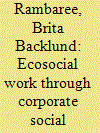

|
|
|
|
|
| Summary/Abstract |
This article presents a case study of corporate social responsibility (CSR) in coastal areas of Mauritius where company CSR work has brought new ways of engaging with communities. The study examines in what ways companies are involved in ecosocial work and what the challenges and possibilities are from an environmental justice perspective. Based on interviews with representatives of companies and other organizations involved with CSR the study shows that CSR involvement in ecosocial work may bring possibilities for advancing environmental justice for local communities as it can enhance resources and capacity building, as well as bring actors together and play a role in advocacy and empowerment work. Challenges include that companies may have difficulties in contributing to greater justice in terms of community involvement. Moreover, inequalities and substantial environmental justice issues, such as access to land and safe housing, are difficult to fully address through a CSR framework.
|
|
|
|
|
|
|
|
|
|
|
|
|
|
|
|
| 10 |
ID:
137445


|
|
|
|
|
| Summary/Abstract |
The dramatic increase in China's economic and hence political power and influence is a common story around the world. Just how clearly and well does this story get across to citizens of some nations other than China, itself? In particular, we ask what Americans know about China. Do they observe its rise? Are their views simple or rich and nuanced? How do they vary across the public? What leads to more positive and what leads to more negative views of China? We report the results of a survey of the American population designed to address these questions. We find that they are reasonably knowledgeable of China's rise and that they have rich and nuanced perceptions of a variety of dimensions of China, its society, economy and polity. These views are, on balance, not especially positive, but the more cosmopolitan the citizen, the more likely they are to hold positive views. Those who are Democrats, who are liberals, and who have had the opportunity to travel in China are especially likely to have positive impressions.
|
|
|
|
|
|
|
|
|
|
|
|
|
|
|
|
| 11 |
ID:
062047


|
|
|
|
|
| Publication |
May 2005.
|
| Summary/Abstract |
'Manufacturing amnesia' argues that the term 'Corporate Social Responsibility' has been abandoned by most South African firms in favour of the term 'corporate social investment'. This has been done in order to divert attention from calls on business to redress the results of its historical contribution to the apartheid system. The discourse of reconciliation has further served to erase memories of past corporate behaviour. It also masks continuing inequalities and unsustainable practices. Business has responded weakly to the pressures for CSR, of which five broad areas are identified and analysed. Voluntary sustainability initiatives have not succeeded and compliance with black economic empowerment charters and environmental standards have to be legislated and regulated. Firms need to reassess their legacies more honestly until which time their CSR contributions will be regarded as cosmetic and self-serving.
|
|
|
|
|
|
|
|
|
|
|
|
|
|
|
|
| 12 |
ID:
094443


|
|
|
|
|
| Publication |
2010.
|
| Summary/Abstract |
In July 2007, Indonesia became the first country to introduce mandatory legal requirements for corporate social responsibility when the Indonesian parliament passed Law 40/2007 on Limited Liability Companies. This paper examines the political dynamics that shaped this and subsequent regulatory developments related to corporate social responsibility and assesses the likely future direction of Indonesia's corporate social responsibility policies. We argue that policy debates over corporate social responsibility in Indonesia have reflected a struggle between the dominant sections of Indonesia's capitalist class, local communities that have been negatively affected by corporate activity and their allies in the non-governmental organization movement, and predatory elements in the political parties and bureaucracy for control over the economic resources generated by the activities of major corporations in that country. We argue that the dominant sections of Indonesia's capitalist class have so far won this struggle in large part because of their instrumental connections to senior Golkar figures within the government. With respect to the future direction of corporate social responsibility policy, we argue that much will depend on the outcome of future presidential elections. If these elections produce a political leadership that supports a mandatory approach to corporate social responsibility, there is some chance that mandatory requirements for corporate social responsibility in Law 40/2007 will be implemented. If they result in the election of a leadership that does not support a mandatory approach to corporate social responsibility, by contrast, such a change is unlikely.
|
|
|
|
|
|
|
|
|
|
|
|
|
|
|
|
| 13 |
ID:
062044


|
|
|
| 14 |
ID:
171037


|
|
|
|
|
| Summary/Abstract |
The diverse geographical areas involved in the Maritime Silk Road Initiative (MSRI) possess different economic, political and social systems that create major challenges for Chinese companies. Corporate Social Responsibility (CSR) offers one potential risk mitigation strategy to sustain the MSRI’s expansion, and relatedly Chinese investment, in places like Africa. As the research shows, though, CSR, as embraced by Chinese firms, has been specifically adapted to fit the Chinese context. Thus, they not only face obstacles in implementing CSR, but localizing Chinese CSR. Their success in surmounting such hurdles will impact the developmental outcomes of Chinese MSRI projects and subsequently African acceptance of these projects. This article concludes CSR remains an effective mechanism for empowering positive change and improving the livelihood and security of affected stakeholders.
|
|
|
|
|
|
|
|
|
|
|
|
|
|
|
|
| 15 |
ID:
177192
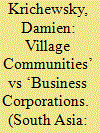

|
|
|
|
|
| Summary/Abstract |
India’s current ‘pro-business’ development regime has been both challenged by depictions of malevolent corporations oppressing helpless village communities and legitimised by depictions of socially responsible corporations ‘developing’ grateful backward communities. To overcome these contradictory narratives, which fail to account for the intricate relationships between villagers and corporate actors, the article analyses how these narratives are constructed in interaction with local conflicts surrounding industrial activity. Guided by a framework based on social systems theory, a detailed study of two cement plants located in Chhattisgarh shows how this interaction operates through multiple discursive layers, which vary in terms of their degree of specification/generalisation and concreteness/abstraction.
|
|
|
|
|
|
|
|
|
|
|
|
|
|
|
|
| 16 |
ID:
151242


|
|
|
|
|
| Summary/Abstract |
Philanthronationalism – the pursuance of corporate ‘good governance’ and equality initiatives for ethno-religious political ends – shapes at a fundamental level business practice in Sri Lanka. In this article, Sri Lankan firms’ approaches to the management of ‘diversity and inclusion’ in human resourcing, brand development, and market expansion and outsourcing are explored. While many in the private sector appear to wish to promote the creation of a more harmonious and peaceful society through ethical governance processes, a continued concern to play to the Sinhala Buddhist nationalist constituency often makes this difficult.
|
|
|
|
|
|
|
|
|
|
|
|
|
|
|
|
|
|
|
|
|